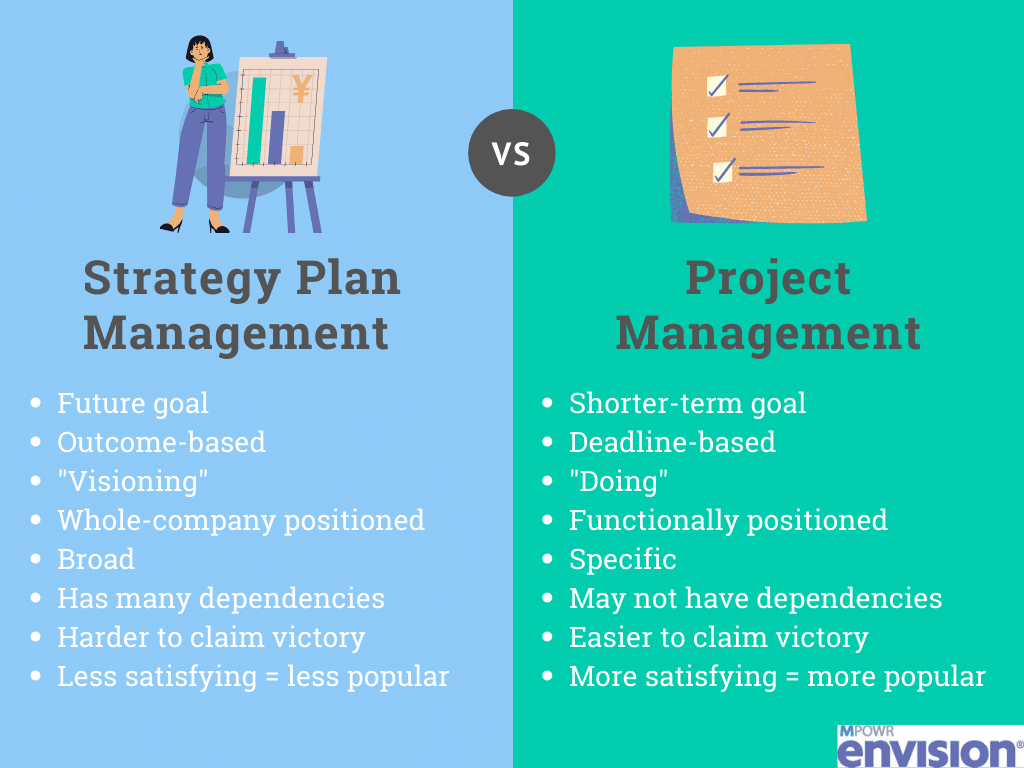
Do You Need to Shake Up Your Strategy? [4 Tips to Make Small But Pivotal Changes]
June 25, 2021
Gap Analysis: Where Do I Start?
August 16, 2021Strategy Plan Management vs. Project Management: The Difference and Why It Matters

What is the difference between Strategy Plan Management and Project Management?
If you didn’t even realize there was one, you’re in the right place.
We hear this question a lot, and as experts in the field, it’s our job to make sure you not only understand the difference between the two, but also recognize their correlation and how they directly impact the health of your company.
Strategic vs Project Management: The 5 Minute Overview
Noor Amran from the Universiti of Malaysia Pahang, succinctly notes the difference between the two in her 2017 publication:
Project management goals focus just on the current product’s or program’s future success and often have a finite timeline, while strategic management goals involve the entire business striving for future success.
But what does that look like for your business?
When you manage your strategy, you gather information about your organization, examine the environment in which it works, and determine your goals for the future. Some questions to ask are:
- What will be the next big thing that will come along?
- How can I prepare myself to meet those challenges?
- What do we have to do now so we can be ready?
- What are the changes I will have to make?
- What are the things we need to make better in all areas of our organization?
As you can tell from the suggestions above, strategies can (and should) shift because of predicted or unforeseen complications. When companies consistently revisit and reflect on their strategic plan, they are more capable to make quick pivots while still adhering to their vision. Although this is the case, companies infrequently schedule time for strategic thought and positioning due to it not being as satisfying as working on the here-and-now. Scheduling regular time for strategic thought and positioning might feel strange, but in the long run it prepares you for your future.
Alternatively, project management contributes to a longer-term strategy, but the outcome is far more immediate and task-based. While strategy is big picture, project management focuses on a specific operational goal (which can be an individual project or a long-term action item) and is deadline-driven, action-type oversight.
Can You Project Manage Your Way to Executing a Solid Strategy?
Many people see executing strategy as a series of projects to complete to realize their vision. We call this ‘strategically tactical.’ Yes, completing initiatives that help you move closer to your end goals is part of executing strategy, but you must make sure you have developed a solid strategy, grounded in the realities of your purpose, vision, and values. You should also have a keen awareness of what is happening in your environment. Without that knowledge, your long-term strategy may be developed in a vacuum, which will affect your ability to be successful. By analyzing your current culture and determining your weaknesses, you put your company in a better position to achieve strategy.
Don’t Choose One or the Other
Organizations need BOTH strategy plan management and project management, but should recognize that they are two distinct things. Project management can pave the way, but if the road is going to the wrong place, it won’t matter how well it’s built. Ensure you take time and make the effort to think about your future.
Companies need project management, and it’s critical for a company that delivers a product or service to be operationally focused or they will lose customers. But we can’t mistake these activities for strategic positioning or achieving a future vision for the organization.
If you thrive with a check list, make one for strategic thinking, reflection, and research. Examine how others think about strategy. Look at the methods people use to arrive at a solid strategy. Explore the tools they employ that help them engage and motivate their teams to accomplish goals.





